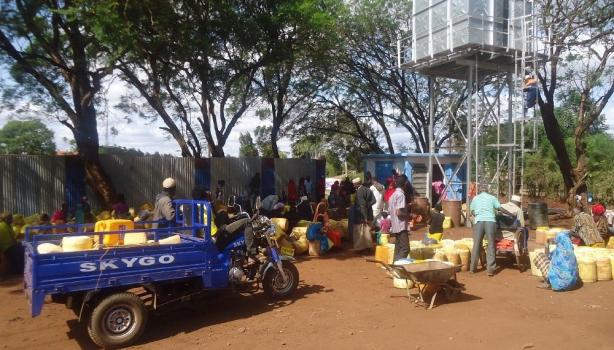USAID at World Water Week: How Strong Governance Attracts Investment
How can universal water and sanitation access be achieved by 2030? To start, these sectors must attract non-traditional financing, as available public financing represents only one-third of the $114 billion in capital investments required annually to achieve universal access, according to the World Bank.
When water is well-managed and regulated, it is an economic good capable of generating revenues which boost the creditworthiness that private sources of finance require, including private domestic sources. Water providers’ ability to leverage public funds to mobilize private investment, however, is a function of not only internal performance, but also a supportive environment anchored by good governance.
USAID’s Water, Sanitation and Hygiene Finance (WASH-FIN) program is designed to facilitate leveraging upwards of $200 million from non-traditional financing sources in Africa and Asia, with the program already helping raise more than $21 million since 2016. However, governance challenges have prevented WASH-FIN from reaching annual financing targets in most of its countries. So why is governance so critical to leveraging financing? It’s simple: Poor governance raises risk exposure for financing institutions, which limits the ability of service providers to access low-cost sources of finance.
Poor governance is also reflected at the water utility level, where weak corporate governance manifests itself in the form of high non-revenue water or as an inability to bill for and collect on all water delivered. Consumers also contribute to poor governance by failing to hold service providers accountable, not safeguarding infrastructure, and at times not paying for services. These challenges and uncertainties create an unacceptable level of risk that causes private sources of capital to shy away from WASH investments and instead deploy their capital elsewhere. But such challenges must be addressed so that the WASH sector can leverage scarce public resources and attract non-traditional financing as part of the massive investment needed to achieve universal WASH access, as three examples of USAID’s work through WASH-FIN illustrate.
In Kenya in March 2019 at the 6th Annual Devolution Conference, USAID worked not only to highlight water as a critical enabler of economic development as part of decentralized service provision, but also to raise awareness about the need for increased financing, and highlight governance impediments constraining this finance. A resolution emerged as a key outcome, tasking national and sub-national government bodies to convene a congress to improve intergovernmental relations between the national and county governments and create a larger fiscal space for the sub-national county-owned water providers.
In Mozambique, meanwhile, more than 1,800 private water providers who serve at least 23 percent of the peri-urban population have experienced difficulty raising financing partly due to their need for a longer-term time horizon to operate and uncertainty regarding how long they can operate within a given area. The providers’ systems can be decommissioned without compensation when the public sector is able to extend its networks, for example, creating a level of risk that is unacceptable to a commercial finance institution. To address these challenges, WASH-FIN and the Supporting the Policy Environment for Economic Development (SPEED+) program have supported these private water providers by helping develop and implement a clear licensing and regulatory framework; facilitating a better understanding of private water providers’ financial contribution; and facilitating dialogue to establish symbiotic relationships between private water providers, public water utilities, and national and local government actors.
Lastly, in the Philippines, the Philippines Water Revolving Fund (PWRF)—established with USAID and Japan International Cooperation Agency (JICA) support—mobilized more than $200 million in blended finance for WASH. To achieve this, good governance and effective economic regulations were essential, and PWRF paved the way for the Government of the Philippines’s Unified Financing Framework (UFF) policy to achieve universal WASH access by 2030. One key challenge? Currently more than 20 agencies are involved with fragmented and sometimes overlapping roles. Absent a single apex agency tasked with WASH development, the country’s National Economic Development Authority (NEDA) has stepped in to lead the UFF process. This is a good solution to start the process, but runs the risk of overstretching NEDA’s capacity and resources. WASH-FIN is supporting NEDA to facilitate a participatory approach to coordinate the various agencies to ensure adoption, operationalization, and institutionalization of the UFF policy and effectively deploy programs and budgets.
These examples reveal the critical relationship between governance and financing, as well as the crucial role technical assistance programs such as WASH-FIN can play in influencing change and enabling better access to non-traditional financing for the WASH sector.
To learn more, please look for us at World Water Week 2019 next week in Stockholm, where we will be sharing USAID’s experiences working at the intersection of governance and finance in a session showcasing examples from Zambia and the Philippines. You can also find information about other USAID sessions at this year’s Stockholm World Water Week here.
For additional information, please visit WASH-FIN’s official website and listen to our USAID Global Waters Radio podcast, “How Improved Financing Enhances Water and Sanitation Service Delivery.”
By Ella Lazarte, USAID, and Barbara Kazimbaya-Senkwe, USAID WASH-FIN


